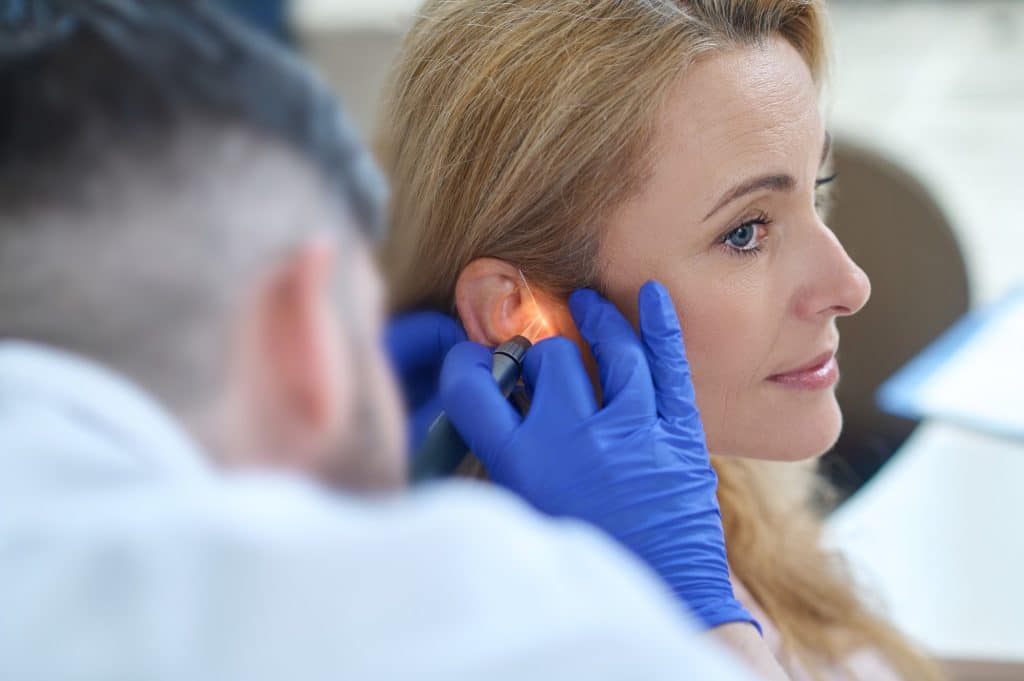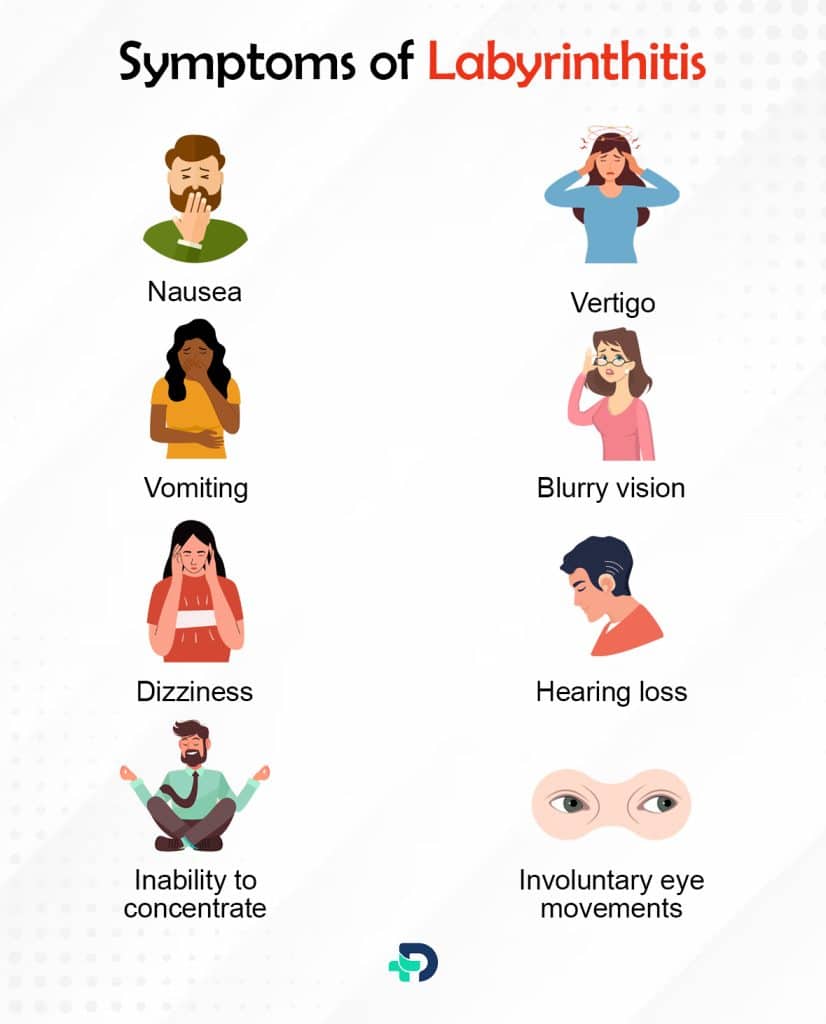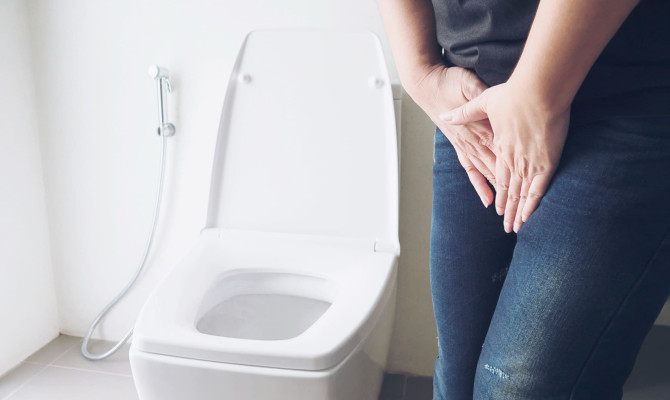Labyrinthitis: Causes, Symptoms, and Treatment

- Labyrinthitis
- 17 Aug 2023
Overview
What is Labyrinthitis?
A condition called labyrinthitis results in inflammation of the inner ear, specifically the labyrinth, which controls balance, hearing, and spatial orientation. Labyrinth is an inner ear membrane, and labyrinthitis is its inflammation and could lead to various symptoms that can significantly impact an individual’s daily life. It usually appears unexpectedly and clarifies in a few weeks if treated. This article will delve into the symptoms, causes, complications, risk factors, prevention, diagnosis, treatment, home remedies and prognosis of labyrinthitis.

Symptoms

Symptoms of Labyrinthitis
Signs and symptoms of labyrinthitis may include:
- Spinning sensation.1Symptoms| Researched based study from Nlm.nih.gov
- Nausea.
- Vertigo.
- Vomiting.
- Blurry vision.
- Dizziness.
- Loss of balance.
- Hearing loss.
- Ringing in the ears.
- Inability to concentrate.
- Involuntary eye movements.
- Unsteadiness.
Causes
Causes of Labyrinthitis
Labyrinthitis may result from
- Viral infections
- Bacterial infections
- Other health problems
Viral Infections
- Labyrinthitis is typically brought on by viral illnesses like the flu or the common cold.
- Also, measles, mumps, rubella, polio, and hepatitis can all result in labyrinthitis.2Causes| Researched based study from Clevelandclinic.org
- These viruses can get inside the inner ear, causing swelling and other symptoms.
Bacterial Infections
- Although less frequent, bacterial illnesses such as meningitis and middle ear infections can also result in labyrinthitis.1Causes| Researched based study from Nlm.nih.gov
Other health problems
- Respiratory conditions like bronchitis may cause labyrinthitis.
- Labyrinthitis can also be brought on by the Epstein-Barr virus, HIV, Syphilis1Causes| Researched based study from Nlm.nih.gov and Herpes viruses, among others.2Causes| Researched based study from Clevelandclinic.org
- Certain auto immune disorders.
Risk factors
Factors increases the risk of Labyrinthitis
Anyone can get labyrinthitis. However, the following conditions may make the chance higher in an individual
- Recent cold and flu.
- Bacterial meningitis.
- Respiratory allergies.
- Middle ear infections.
- Autoimmune conditions.
- Recent head injuries.
- History of ear surgery.
- Viral diseases like measles and herpes.
- Smoking habit.
- Getting exposed to secondhand smoke.
- Excess alcohol consumption.
- Emotional stress.
- Certain medications3Risk factors| Researched based study from Medlineplus.gov
- A weakened immune system, like in people with HIV or under chemotherapy.
Diagnosis
Diagnosis of Labyrinthitis
Doctors often take into account a variety of characteristics, including medical history, physical examination, and particular tests to diagnose labyrinthitis as follows:
Medical history
- The patient will be questioned by the doctor regarding the symptoms they had, how long they persisted, and any previous bacterial or viral infections.
Physical Examination
- Includes a thorough examination of the ears, nose, and throat to check for signs of inflammation, infection, or fluid accumulation.
- May also check the eye movements4Diagnosis| Researched based study from Healthdirect.gov
- Measure the blood pressure.
- Check the balance of an individual.
Hearing Tests
- like audiometric tests can evaluate the extent and nature of hearing loss caused by labyrinthitis.
Vestibular Tests
- Like electronystagmography (ENG) or videonystagmography(VNG)5Diagnosis| Researched based study from Cedar-sinai.org , can assess the functioning of the vestibular system and detect any abnormalities associated with labyrinthitis.
Imaging tests
- To rule out additional potential causes or problems, doctors may request computed tomography (CT) or magnetic resonance imaging (MRI) scans.3Diagnosis| Researched based study from Medlineplus.gov
Treatment
Treatment of Labyrinthitis
Treatment for labyrinthitis seeks to reduce symptoms, control complications, and deal with the underlying cause. It may involve:
- Medications
- Vestibular rehabilitation
- Symptom management
- Supportive care
- Surgical management
Medications
- Antiviral medicines, antibiotics, and pain relievers like NSAIDs may be administered to treat viral or bacterial infections, lessen inflammation, and ease symptoms.
- Corticosteroids and antihistamines may also be administered.
Vestibular Rehabilitation
- Exercises and maneuvers used in physical therapy can help patients with long-term labyrinthitis improve their balance and lessen their symptoms of dizziness or vertigo6Treatment| Researched based study from Nlm.nih.gov
Symptom Management
- Specific symptoms like vertigo, nausea, or tinnitus may require medication or lifestyle changes.
Supportive Care
- During recovery, the patient should rest well, consume water, and eat a balanced diet.
- Avoiding stressors like loud noises and bright lights may also be helpful.
- Some patients may need hearing aids.
Surgical management
- Only a small percentage of instances require surgical intervention, such as mastoidectomy for individuals with cholesteatoma or severe mastoiditis.
- Occasionally, patients with labyrinthitis due to otitis media may need a surgical incision into the eardrum to relieve pressure from the fluid.1Treatment| Researched based study from Nlm.nih.gov
At-home management
Labyrinthitis symptoms can be controlled at home by the self-care techniques listed below:
- Lying on your side when experiencing dizziness.
- Consume bland, uncomplicated foods that are easy to digest, like bread, pasta, baked or boiled potatoes, and bananas7Treatment| Researched based study from Hhma.org
- Alcohol, oily, sugary, or salty foods, and coffee or other caffeinated beverages should be avoided by people with labyrinthitis8Treatment| Researched based study from Vestibular.org
- Eustachian tubes, a narrow passage that connects the throat and middle ear, can be cleared by gargling with warm salt water.
- If you feel faint, seek assistance.
- Avoid quick changes in position or movement.
- Consider using meditation or mindfulness as stress-reduction techniques.
- Avoid alcohol consumption4Treatment| Researched based study from Healthdirect.gov
- Drink a lot of water to as dehydration is a possibility.
- Keep a calm, stress-free environment.
- Stay away from bright lights.
- Avoid driving, operating heavy equipment, and climbing heights.
- Learn at-home exercises to handle problems with balance and practice them regularly.
- Aim to return to the previous activity, sport, or work without restricting movements.
How long does labyrinthitis last?
- Labyrinthitis symptoms usually do not disappear entirely right away. In most cases, severe symptoms subside after a week. Most people reach full recovery in two to three months.9Treatment| Researched based study from Pennmedicine.org Long-lasting dizziness is more common in older people. Your balance could take six weeks or more to get back to normal.
Prevention
Prevention of Labyrinthitis
Even though labyrinthitis cannot be avoided, there are steps that people can take to lessen the likelihood of getting it.
These preventive measures may include:
- Practicing great hygiene, which includes frequent hand washing and keeping a distance from people who are contagious with respiratory diseases.
- It’s essential to stop smoking or limit exposure to secondhand smoke as smoking lowers the immune system and harms the respiratory system, making people more prone to infections that can cause labyrinthitis.
- People with allergies should obtain appropriate therapy and control symptoms properly.
Complications
Complications of Labyrinthitis
Labyrinthitis can result in a number of consequences if it is not adequately controlled or treated, including :
- Visual disturbances.
- Impaired spatial awareness1Complications| Researched based study from Nlm.nih.gov
- Tinnitus or ringing sound in the ear.
- Partial or complete hearing loss1Complications| Researched based study from Nlm.nih.gov
- Recurrent infections.
- Increased stress, anxiety, and depression.
- Fractures from falls in older adults.
- Frequent vomiting and dehydration.
Prognosis
Prognosis of Labyrinthitis
Labyrinthitis can cause various unfavorable side effects that can lower a person’s quality of life. The prognosis for labyrinthitis depends on a number of factors, including the severity of the symptoms, the root cause of the condition and overall health condition of an individual. The duration of labyrinthitis might range from a few weeks to a few months. When given the right care and symptom control, most of them fully recover. However, some people could still develop long-lasting effects like minor imbalances or tinnitus. Chances of developing long-term disorders with the inner ear might be decreased with prompt treatment.
Any feedback on this article?
 This Articles content was accurate
This Articles content was accurate Very Informative Article
Very Informative Article I have a question or a comment
I have a question or a comment
 This article contains inaccurate content
This article contains inaccurate content This article was not helpful
This article was not helpful I have a question or a comment
I have a question or a comment
We appreciate your helpful feedback!
Checkout our social pages
References
-
National Library of Medicine
Labyrinthitis | Symptoms
-
Cleveland Clinic
Labyrinthitis | Causes
-
Medline Plus
Labyrinthitis | Risk
-
Health Direct
Labyrinthitis | Diagnosis
-
Cedar-Sinai
Labyrinthitis | Diagnosis
-
National Library of Medicine
Vestibular Rehabilitation Therapy: Review of Indications, Mechanisms, and Key Exercises | Treatment
-
Tufts Medical Center
Labyrinthitis and Vestibular Neuritis | Treatment
-
Vestibular Disorders Association
DIETARY CONSIDERATIONS | Treatment
-
Penn Medicine
Labyrinthitis | Treatment





































